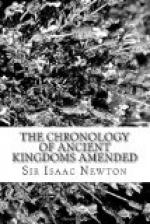But how uncertain their Chronology is, and how doubtful it was reputed by the Greeks of those times, may be understood by these passages of Plutarch. Some reckon, saith he, [1] Lycurgus contemporary to Iphitus_, and to have been his companion in ordering the Olympic festivals: amongst whom was Aristotle the Philosopher, arguing from the Olympic Disc, which had the name of Lycurgus upon it. Others supputing the times by the succession of the Kings of the Lacedaemonians, as Eratosthenes and Apollodorus, affirm that he was not a few years older than the first Olympiad._ First Aristotle and some others made him as old as the first Olympiad; then Eratosthenes, Apollodorus, and some others made him above an hundred years older: and in another place Plutarch [2] tells us: The congress of Solon_ with Croesus, some think they can confute by Chronology. But an history so illustrious, and verified by so many witnesses, and (which is more) so agreeable to the manners of Solon, and so worthy of the greatness of his mind and of his wisdom, I cannot persuade my self to reject because of some Chronological Canons, as they call them: which hundreds of authors correcting, have not yet been able to constitute any thing certain, in which they could agree among themselves, about repugnancies_. It seems the Chronologers had made the Legislature of Solon too ancient to consist with that Congress.
For reconciling such repugnancies, Chronologers have sometimes doubled the persons of men. So when the Poets had changed Io the daughter of Inachus into the Egyptian Isis, Chronologers made her husband Osiris or Bacchus and his mistress Ariadne as old as Io, and so feigned that there were two Ariadnes, one the mistress of Bacchus, and the other the mistress of Theseus, and two Minos’s their fathers, and a younger Io the daughter of Jasus, writing Jasus corruptly for Inachus. And so they have made two Pandions, and two Erechtheus’s, giving the name of Erechthonius to the first; Homer calls the first, Erechtheus: and by such corruptions they have exceedingly perplexed Ancient History.
And as for the Chronology of the Latines, that is still more uncertain. Plutarch represents great uncertainties in the Originals of Rome: and so doth Servius. The old records of the Latines were burnt by the Gauls, sixty and four years before the death of Alexander the great; and Quintus Fabius Pictor, the oldest historian of the Latines, lived an hundred years later than that King.
In Sacred History, the Assyrian Empire began with Pul and Tiglathpilaser, and lasted about 170 years. And accordingly Herodotus hath made Semiramis only five generations, or about 166 years older than Nitocris, the mother of the last King of Babylon. But Ctesias hath made Semiramis 1500 years older than Nitocris, and feigned a long series of Kings of Assyria, whose names are not Assyrian, nor have any affinity with the Assyrian names in Scripture.




